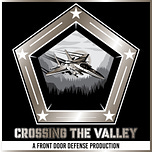Overview
Second Front Systems is a public benefit venture-backed corporation founded to accelerate the adoption of commercial software for Defense.
The company’s flagship product is Game Warden, a platform-as-a-service designed to allow companies to configure, secure, and deploy software to Department of Defense customers with a fully managed and compliant production environment. The company solves the problem of long accreditation approval timelines (averaging 18 months) that cost millions of dollars to traverse. Formerly, each software update or application variant would trigger a re-authorization or re-accreditation cycle. The results are devastating for innovation. The compliance hurdles are known, and they are many.
Tyler Sweatt is the company’s CEO. He is a retired Army Officer, a West Point grad, and a lifelong national security practitioner. He also hosts his own podcast, ‘All Quiet on the Second Front,’ in which he dives deep into various defense and national security-related topics alongside leading defense, industry, and VC experts. But in this episode, we turned the tables and dove deep into Second Front and two types of transitions: technology and careers.
Go to Market:
“I want the government paying for impact, not for infrastructure.”
Commercial companies are Second Front’s primary customers, and the idea is to serve as companies’ deployment pipelines and secure hosting environment. At the same time, the ultimate customer (the end-user) is the federal government. As a result, they are always thinking about how to reduce friction for companies and the government.
Many times commercial companies get government contracts via IDIQ, SBIR, OTAs, and other contract pathways that require an Authorization to Operate (ATO). This is where Second Front steps in and provides a platform to expedite the ATO process by meeting the security requirements for each specific contract.
Additionally, Second Front has their own government contracts, including IDIQ and SBIR Phase III awards. These contracts allow government customers to contract directly with Second Front to accelerate deployment of a product or application that the government wishes to use.
The key for the team is to not become reliant on government revenue; the experiences of the team from their time inside the Defense Department serves as cautionary reminders that the risks are great and unpredictability is too high. In order to be successful, they must diversify their business model.
The Human Transition:
We talked a bunch about people coming out of the government and transitioning to industry, and the challenges they face. Roles aren’t 1:1 - strategy inside the DoD isn’t necessarily the same as strategy within a company.
Tyler used the framework of value creation and value protection, identifying these as the fundamental roles in a startup. He advised job-seekers to find their position in one or the other; everything else comes later.
We both share the desire to find a way for folks to come and go between opportunities, between government and industry, startups and big firms, and develop the empathy and shared language to make it all possible. We’ve got to become ok with that. I couldn’t agree more.
Case Takeaways:
Different problems require different teams: The 2F problem set - deploying commercial software in the defense market - requires a deep knowledge of processes and trust with officials. It’s a classic insider problem, so they compiled a deep insider team. Peter Dixon, the company’s founder, was a known entity and an established presence who had worked in the industry for a long time. Enrique Oti, the company’s CTO, had helped found Kessel Run. Tyler had worked at numerous national security and defense companies.
“Mo’ ways for mo’ apps is mo’ better”: The ecosystem is broad, and the environments are many. The environment here is not zero-sum: just because Second Front wins, does not mean that another platform or deployment environment (such as Kessel Run’s All Domain Common Platform, or PlatformOne) will “lose.” They have different purposes and use cases.
Know the North Star, and deliver to it: In Tyler’s own words, “our relationship with the government is designed to ensure we can be the lever for software to go drive change.” The Second Front team doesn’t want to be the “next software prime” or to take a strong position on the government software configuration. Instead, they are happy to play whatever role they need to get the software deployed fast.
Separate the markets: Even though the government is the ultimate end-user for all of Second Front’s customers, they split their sales team into a commercial and federal practice. This allows them to tailor unique processes, approaches, and learnings for each. As Tyler says, “going after everything is a fool’s errand. You’ll just miss it all.”
Incentives Rule the Day: The Defense Department and Congress have conditioned certain behaviors - of their employees, of primes, and of all the ecosystem players. That doesn’t make those folks bad people, and these are not immutable characteristics. We talked about Defense Ventures fellows, and how many have come out of government and gone on to be incredible contributors and leaders in different startup contexts. It’s just a matter of conditioning. Tyler’s idea for a sort of re-conditioning transition program is greatly needed.
For more:
Second Front: https://www.secondfront.com/
Offset Symposium: https://www.secondfront.com/offset-symposium
Crossing the Valley: https://www.youtube.com/@FrontdoorDefense













Share this post